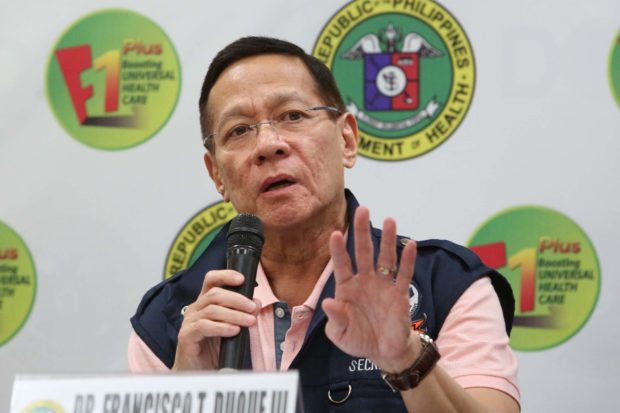Duque pressed: To kiss or not to kiss?

Health Secretary Francisco Duque III—MARIANNE BERMUDEZ
MANILA, Philippines — Education officials have adopted policies on “social distancing” as suggested by Health Secretary Francisco Duque III following the rise in cases of the new coronavirus disease (COVID-19) in the country.
And even lovers are being asked to find other means of expressing affection aside from kissing, when Duque was asked about this form of intimate contact during a House hearing on Wednesday.
The hearing, called by the House committee on health, dwelt briefly on the subject of romance, with Iloilo Rep. Janette Garin, a former health secretary, asking Duque:
“[W]hat would be our advice to those dating and kissing their girlfriends?”
“A lot of congressmen and colleagues are asking me” about that matter, Garin noted.
Article continues after this advertisementArm’s length
She pressed Duque again when he was sidetracked by other issues related to the epidemic: “Can [people] kiss or can [they] not kiss, Secretary Duque?”
Article continues after this advertisementDuque replied in jest: “We have to subject kissers to a risk assessment.”
But he emphasized that Filipinos must take the concept of social distancing seriously to avoid contracting the pneumonia-causing coronavirus.
Social distancing, or keeping at least “one arm’s length” from others in public spaces, creates a “virtuous cycle” of fewer people getting exposed to the virus and resulting in less severe and less infectious cases, he explained.
‘Exercise flexibility’
Duque also acknowledged the “huge challenge” of practicing the concept in densely populated Metro Manila, especially among those who use mass public transport.
“The challenges we’re facing are not easy. I understand your sentiments but you can expect that we will coordinate with your office for steps to address this problem,” Duque said, addressing Bayan Muna Rep. Carlos Zarate.
Also on Wednesday, the Department of Education (DepEd) said it was implementing social distancing measures for the remainder of the school year, while Commission on Higher Education (CHEd) Chair Prospero de Vera III instructed colleges and universities to “exercise flexibility” in adjusting their academic calendars.
DepEd officials directed teachers to conduct important school activities, such as fourth-quarter exams and other remaining class requirements, on a “staggered basis” from March 16 to 20 to reduce the number of students in school per day.
The tests were initially scheduled for March 12 to 13 for Grades 6 and 12, and March 19 to 20 for all other grade levels.
The DepEd said schools could push through with the exams because “the essential competencies specified in the curriculum are expected to have been covered” during the school year.
Online classes
“I’m not worried because children, even before COVID-19, were already familiar with the health protocols in schools. They were taught to wash their hands before entering and leaving their classrooms,” Education Secretary Leonor Briones said in a press conference on Wednesday.
The DepEd advised teachers to give students pointers in reviewing for exams while classes were suspended until March 14.
Teachers may also opt to work from home, it said.
Briones encouraged online classes and other internet-based learning resources, “where it is possible.”
“Some children do not have access to the internet, so this is not possible in all places. But our technical people are thinking of ways to conduct [classes remotely] even without internet connectivity,” she said.
On suggestions to reschedule graduation rites, the DepEd said schools had the discretion to hold these ceremonies within April 13 to 17, provided they follow guidelines set by the Department of Health (DOH) on such gatherings.
“We trust the schools, we trust the parents and their capacity to assess if they can strictly implement the DOH requirements,” Briones said.
She also suggested holding graduation rites in batches to control the size of crowds and limiting guests in these ceremonies.
Discretion
In his advisory to colleges and universities, De Vera recommended that they forgo other curricular activities and carry out alternative activities for students undergoing practicum or on-the-job training.
On the field deployment of National Service Training Program students, the CHEd official urged universities and colleges to exercise discretion and allow alternative school-based service activities.
De Vera called on state colleges and universities to consult with their regents about specific measures and inform the CHEd regional office about protocols.
For more news about the novel coronavirus click here.
What you need to know about Coronavirus.
For more information on COVID-19, call the DOH Hotline: (02) 86517800 local 1149/1150.
The Inquirer Foundation supports our healthcare frontliners and is still accepting cash donations to be deposited at Banco de Oro (BDO) current account #007960018860 or donate through PayMaya using this link.